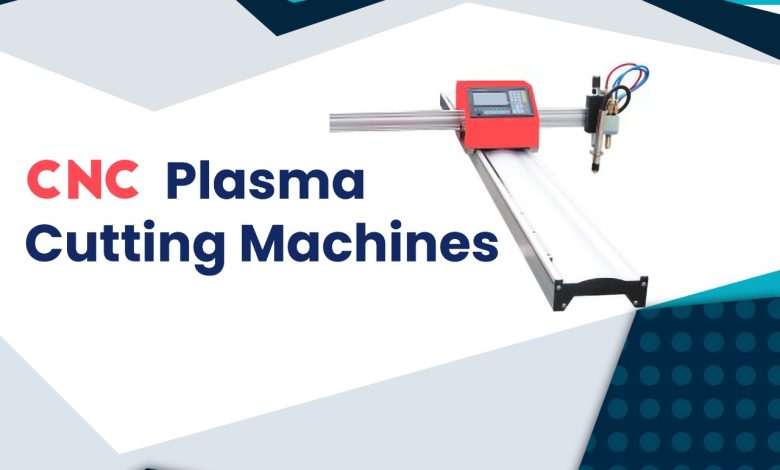
When it comes to cutting metal, there is no other process that can compare to a CNC plasma cutting machine. Not only does it produce high-quality cuts with little to no distortion, but it is also faster and more efficient than other methods.
If you are looking for the best plasma cutting machine, you need to read this post. In it, we will discuss what you need to know, and all of the necessary information on these high-performance CNC plasma machines.
What is CNC Plasma Cutting Machine?
A CNC plasma machine employs a plasma cutter to cut thin to thick metals along a multi-axis grid. Due to the cut being designed and controlled by a computer instead of human motion, the CNC approach has an advantage over handled plasma cutting instruments.
Plasma cutting is a machine that is commonly used in the manufacturing industry. Compressed air and direct current power source are used. The compressed air is ionized and converted into plasma by the plasma cutting equipment.
The cutting process for conductive materials is therefore accomplished.
According to the global CNC machine market, the CNC plasma metal cutting machine was valued at $53,069.1 million in 2020 and is expected to reach $83,364.4 million by 2030, growing at a CAGR of 4.2% between 2020 and 2030.
How to operate a CNC plasma cutting machine?
Plasma cutters are becoming more common in many industries, including metal fabrication, construction, and automotive repair. By creating a very high-temperature, electrical channel of ionized gas, also known as plasma, this tool can cut through a variety of metals, including steel, copper, brass, and aluminum.
The cutter transmits an electric arc through a gas (either oxygen, nitrogen, or argon) to rapidly increase the heat levels to the point where it goes beyond a solid, liquid, or gas and becomes plasma. The plasma will then be used by the machine to transfer energy to any conductive metal, letting it, cut through with little or no resistance. This approach produces a clean, quick-cutting procedure.
Types of Plasma Cutting Machine
CNC Plasma cutting machine manufacturers classified these plasma machines into several sorts. Depending on the organization, the material you cut, and what you produce, you can select the ideal cutting machine for you.
They each have unique characteristics.
Models of plasma cutting machines are:
Pro cut: It is very useful for heavy tasks. It has CNC hardware that runs on Windows. It is equipped with a rack and pinion system with servo motors.
Bevel cut: A bevel cut is a more advanced variant of the Pro cut. It provides a particularly smooth surface as well as Y, X, V, and K welding preparations.
Tube cut: It is preferred for raw pipe cutting. Allows for greater versatility in cut edges.
Oxy cut: For hard labor, oxy cut provides good options. The maximum cutting capacity is 300 mm.
Compact cut: It can cut materials with high precision.
Eco cut: It is very economical and does plasma cutting with eco-cut CNC and Hypertherm equipment.
Primary Components Of CNC Plasma Cutting Machine
To better comprehend plasma cutting and how a plasma arc is ignited, it is critical to understand the four key system components of every plasma cutting system:
the power supply, RHF console, gas console, and torch.
Power Supply is a source of DC power with a consistent current. It houses the control circuit required for the appropriate plasma system sequencing. The cooling system for the torch is likewise housed in the power supply.
The RHF console also houses the remote high-frequency starting circuit, enabling installation of the power supply up to 200 feet from the RHF console and more effective electrical noise shielding.
Gas Console contains metering and solenoid (coiled wire) valves for shield and plasma gases. The shield and plasma gas supplies, the RHF console, the power supply, and the motor valve console are all interfaced by the gas console. Make sure the gas console is situated above the power source for the operator’s convenience.
The torch is the most crucial part of the plasma cutting system because it contains all of the consumables and creates the plasma arc itself.
CNC plasma cutting machine working principle
The plasma cutting machine uses electrical conductivity to cut hot, accelerating plasma. Additionally, it provides the materials with a highly clean and sharp aspect.
It can be used to cut materials including copper, steel, aluminum, and sheet metal. A gas that has been heated up and electrically ionized is the essential operating principle.
An electrical channel is made in the direction of the material to be sliced by this gas, or plasma energy. The system is turned on after grounding the electrical circuit.
Depending on the material to be cut during cutting, oxygen or air may be employed.
After some of the gas is ionized by the electric arc, the electrical channel is created.
The electrical channel construction enables the cutting torch to function and provides the heat necessary to melt the material.
By utilizing high-speed plasma and compressed gas, our plasma cutting machines provide the surface with a smooth appearance.
What kind of gas is employed by plasma cutting machines?
The CNC Plasma Cutting Machine Manufacturers design the machines in order that the plasma cutter requires gas in order to operate and produce plasma.
As previously indicated, oxygen, nitrogen, and argon are the most widely used gases. A few plasma cutter systems have multi-gas capabilities, allowing a range of gases to be employed for various applications.
The type of metal you are cutting determines the type of gas you utilize:
Oxygen: Given that it offers the quickest plasma cutting speed of any gas, oxygen has come to be the industry standard for use when cutting steel.
Nitrogen: It is the best choice for cutting aluminum and stainless steel because it produces excellent cut quality.
Argon: Because it is the hottest burning plasma, argon is ideal for cutting thick stainless steel and aluminum.
Clean dry shop air: It is a more cost-effective option that will cut through mild and stainless steel as well as aluminum.
Which Metals can a CNC Plasma Cutting Machine Cut?
A plasma cutter can only be used on non – conducting metals and alloys. These are some examples:
Stainless steel
Mild steel
Titanium
Aluminum
Copper
Brass
Cast Iron
Monel
Inconel
Some of these metals’ melting points make them difficult to work with because the machine’s cutting capacity decreases as the metal’s electrical conductivity increases, resulting in an uneven or messy edge.
About The Author
Vigor Welding is an ISO 9001:2008 certified business. We manufacture, wholesale, and distribute CNC plasma cutting and Inverter Based Welding Machines, among other things.
Our provided CNC plasma machines, which come in a variety of sizes, are frequently utilised in various metal production and construction locations.



